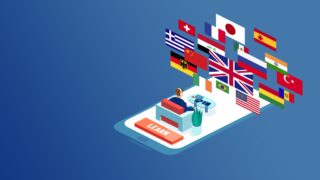Leading High Performing Remote Teams
How can leaders ensure that performance remains high in remote or hybrid-work environments?
Content Marketing
In this course, you’ll learn how compelling blogs, videos, podcasts, and other media can reach customers and drive sales. You’ll also learn steps for creating an effective content marketing plan, and some important ways to measure its impact and success.
Content marketing is a essential digital marketing strategy for companies looking to provide relevant and useful information to support your community and attract new customers.
Get started on your content marketing journey today.
Sustainable Innovation in Times of Disruption: Choices for a Better Society
There are opportunities for progress all around us. The key is to innovate on these opportunities sustainably.
To help identify most effective path forward, you'll need to gain a global perspective to these challenges in an open discussion. How can Japan and the world take action to create a more sustainable, innovative world? Where do you fit in?
It's time to find out.
Social Media & Digital Communications: Impact on Global Public Opinion
Social and digital media have dominated the communications industry for decades. But it's no secret that social media has the power to sway public opinion, and the way in which many companies use these platforms could be seen as manipulative.
What do companies need to be aware of when utilizing social and digital media? How can these mediums be used to better communicate strategically with the world?
Discover what top media and communications experts have to say.
CAGE Distance Framework
Want to expand overseas? The CAGE distance framework can help ensure you're constructing a solid global strategy in four areas: cultural, administrative, economic, and geographic. Learn how to leverage useful differences between countries, identify potential obstacles, and achieve global business success.
Servant Leadership
There's more to leadership than driving a team to profit. In fact, there's a word for looking beyond self-interest to prioritize individual growth: servant leadership. Try this course for a quick breakdown of what that is, how it works, and how it can lead to organizational success.
Strategy: Creating Value Inside Your Company
Have you ever wondered why certain companies are more successful than others? The answer is strategy: internal processes that control costs, allocate resources, and create value. This course from GLOBIS Unlimited can give you the tools you need for that strategic edge.
Strategy: Understanding the External Environment
To plan strategy on any level, you need to understand your company's external environment. In fact, your level of understanding can impact hiring, budgeting, marketing, or nearly any other part of the business world. Want to learn how to do all that? This course from GLOBIS Unlimited is the perfect first step!
Using Japanese Values to Thrive in Global Business
Japanese companies have unique cultural, communication, and operational challenges. But they also have values that have led to remarkable longevity. Check out this seminar to hear how these values help earn trust from overseas head offices and develop employees.
Marketing: Reaching Your Target
Every company works hard to get its products into the hands of customers. Are you doing everything you can to compete? In this course, you’ll find a winning formula to turn a product idea into real sales. Follow along through the fundamentals of the marketing mix and see how companies successfully bring products to market.
Basic Accounting: Financial Analysis
Want to compare your performance vs. a competitor? Or evaluate a potential vendor? Then you'll need to conduct a financial analysis. This course will teach you how to use three financial statements and evaluate financial performance in terms of profitability, efficiency, soundness, growth, and overall strength.
Career Anchors
What drives you to be good at your job?
Career anchors are based on your values, desires, motivations, and abilities. They are the immovable parts of your professional self-image that guide you throughout your career journey.
Try this short GLOBIS Unlimited course to identify which of the eight career anchors is yours!
Leadership with Passion through Kokorozashi
The key ingredient to success? Passion.
Finding your kokorozashi will unify your passions and skills to create positive change in society. This GLOBIS Unlimited course will help you develop the values and lifelong goals you need to become a strong, passion-driven leader.
With cultural diversity come differences in thoughts and actions—a good and necessary outcome for any organization. But the dynamics diversity brings also pose some unique challenges. If someone unintentionally or ignorantly commits some cultural faux pas, misunderstanding and miscommunication can easily arise.
As such, more and more professionals and organizations are investing in cultural training to help them navigate today’s increasingly culturally diverse business spaces. Educating yourself to be culturally intelligent without proper context and frameworks, however, can lead to mindless cultural training. It results in cultural stereotyping, which only serves to exacerbate the original problem of cultural insensitivity.
So what is the solution? I propose cultural mindfulness.
Next Article
The Cross-Culture Competency Quiz: Are You Ready to Join the Global Community?
8 Scales to Chart a Culture Map for Better Management
Mindfulness Is the Key to Quality Corona Era Communication
Cultural Mindfulness: A Definition
Culture is broadly defined as the ideas, customs, and social behavior of a particular people or society. In an organizational setting, culture is the collection of written and unwritten values, philosophies, and practices that govern how members of an organization behave and interact internally and externally.
Mindfulness, meanwhile, is commonly known as the psychological process of bringing one’s attention to experiences occurring in the present moment. In other words, living in the moment and being conscious of our own thoughts and behaviors as we interact with other people or situations.
Combining the above definitions gives us cultural mindfulness, a state of being mindful of, first, your own cultural construct, and second, the cultural constructs of the other person you are interacting with at any given moment. It simply means reacting or responding to the actual stimuli (the other person) without the baggage of cultural stereotyping.
It’s important to stress that the focus of cultural understanding or awareness should first be within (yourself) and then manifest externally by being mindful of other people’s cultural conditioning.
Why Cultural Mindfulness
Why do we need cultural mindfulness? Simple answer: to avoid becoming too ethnocentric.
Ethnocentrism in itself is not bad. We all have and need a certain degree of ethnocentrism in our lives to have a healthy appreciation of our own background, origin, and culture. Such perspective plays a significant role in how we define ourselves, form our belief systems, and identify with others. The challenge is to find the balance between knowing your own culture and being open to understanding the culture of others.
At its worst, an ethnocentric worldview may lead to one (or even all) of the following:
- A tendency to view our own culture as the “master culture”
- A mentality or mindset of “us” versus “them”
- A tendency to become self-focused and self-absorbed
- A fear of stepping outside our own bubbles of reality and experience
- A judgmental outlook—or worse, bigotry, hatred, and rage
Another good reason to pursue cultural mindfulness is that it helps us develop an awareness of our own cultural biases. We all have (and sometimes even need) biases. As leading neuroscientist Dr. David Rock says, “If you have a brain, you are biased.” Unfortunately, there are just too many cognitive biases that we, as a species, have learned and accumulated as a result of thousands of years of evolution.
Having awareness of all of our cognitive biases is impossible. However, it’s crucial that we try to be aware of at least our cultural biases. The key is not to deny them, but to recognize that we have them. And through the process of self-awareness (and being open to how other people experience and view their own cultural biases), we can identify cultural lenses and conditioning. In essence, we become culturally mindful.

Practicing Cultural Mindfulness
In Japan, the concept of being on time is predominantly observed—even expected. In fact, “Japan time” is actually five to ten minutes earlier than the appointed time on the clock. If a Japanese person arrives late, there’s often a quick judgement that they are not being “Japanese.” There’s no real effort made to know the reasons why they were late or even determine if this is a one-time event or a recurring behavior of the individual.
Being culturally mindful in this instance would mean that we first become aware of our own concept of time. Is it several minutes before the appointed time? Exactly on time? Several minutes after the appointed time?
Then, we inquire. We seek understanding of the other person’s concept of time.
Finally, we find out the reason or reasons that contributed to the delay. Was the train late? Did they miscalculate the time needed to get here? Was there an accident? Or were they, in fact, just being lazy?
From there, we can make a more informed reaction based on that incident and act accordingly.
The reverse is also true. If a Filipino arrives on time for an appointment, people may be surprised. There is a prevalent cultural stereotype of “Filipino time,” which is later than the appointed time. Personally, I have always subscribed to the concept of “Filipino time,” but plan my appointments so that I show up at least five to ten minutes in advance. Does that make me less Filipino and more Japanese? Not at all. It’s simply a personal preference. I want to manage my own time while respecting other people. The cultural stereotype dictates that since I was born and raised in the Philippines, I should be following Filipino time. But in reality, I show up on time consistently, following the Japanese cultural stereotype.
And that was true even before I came to live in Japan and learn its cultural norms.
In short, cultural mindfulness teaches us how to understand ourselves first, and then others. When dealing with cultural issues, the first step is to withhold judgment. Be aware of your own cultural biases and conditioning, and then seek to understand the perspectives of the people you encounter.
Abridged from The HR Agenda Magazine with permission.






